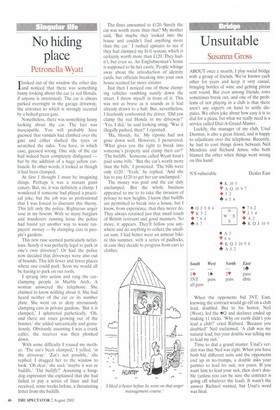No hiding Place
Petronelia Wyatt
Ilooked out of the window the other day land noticed that there was something funny looking about the car (a red Honda, if anyone is interested). The car is always parked overnight in the garage driveway, the entrance to which is strongly secured by a bolted green gate.
Nonetheless, there was something funny looking about the car. The fact was inescapable. You will probably have guessed that vandals had climbed over the gate and either slashed the tyres or scratched the sides. You have, in which case, guessed wrong. One side of the car had indeed been completely disfigured — but by the addition of a huge yellow carbuncle. In other words, it looked as though it had been clamped.
At first I thought I must be imagining things. Perhaps it was a mutant giant canary. But, no, it was definitely a clamp. I wondered if someone had played a practical joke, but the job was so professional that I was forced to discount this theory. This left only the police. Righteous anger rose in my bosom. With so many burglars and murderers running loose the police had found yet another way to waste taxpayers' money — by clamping cars in people's gardens.
This new ruse seemed particularly nefarious. Surely it was perfectly legal to park in one's own driveway? Or had the police now decided that driveways were also out of bounds. This left fewer and fewer places where one could park. Soon we would all be having to park on our roofs.
I sprang into action and rang the carclamping people in Marble Arch. A woman answered the telephone. She claimed to know nothing about it. She had heard neither of the car or its number plate. She went on to deny strenuously clamping cars in private gardens. 'But it is clamped,' I spluttered pathetically. `Oh, and there are roses growing out of the bonnet,' she added sarcastically and gratuitously. Obviously assuming I was a crank caller, the receiver was then plonked down.
With some difficulty I roused my mother. 'The car's been clamped,' I yelled, in the driveway.' Zat's not possible,' she replied. I dragged her to the window to look. 'Oh dear,' she said, 'maybe it was ze bailiffs.—The bailiffs?' Assuming a hangdog expression she explained that she had failed to pay a series of fines and had received, some weeks before, a threatening letter from the bailiffs.
The fines amounted to £120. Surely the car was worth more than that? My mother said, 'But maybe they looked into the house and couldn't find anything more than the car.' I rushed upstairs to see if they had clamped my hi-fi system, which is certainly worth more than £120. They hadn't, but even so. An Englishwoman's home is supposed to be her castle. People whinge away about the introduction of identity cards, but officials breaking into your own house seemed far more sinister.
Just then I noticed one of those clamping vehicles rumbling nastily down the street. I threw myself in front of it. This was not as brave as it sounds as it had already drawn to a halt. But, nevertheless, I fearlessly confronted the driver. 'Did you clamp the red Honda in my driveway?' 'Yes, I did,' he said looking smug. Was it illegally parked, then?' I riposted.
'Ha, bloody, ha.' My riposte had not gone down well. However, I persevered. 'What gives you the right to break into someone's property and clamp their car?' 'The bailiffs. Someone called Wyatt hasn't paid some bills.' But the car's worth more than the bills,' I protested. 'The bills were only L120; `Yeah,' he replied. 'And she has to pay £120 to get her car unclamped.'
The money was paid and the car duly unclamped. But the whole business appeared to me to to take the invasion of privacy to new heights. I know that bailiffs are permitted to break into a house, but I know, from experience, that they never do. They always retained just that small touch of British restraint and good manners. No more, it appears. They'll follow you anywhere and do anything to collect the smallest sum. I had better wear an armour bikini this summer, with a series of padlocks, in case they decide to progress from cars to clothes.


























































 Previous page
Previous page